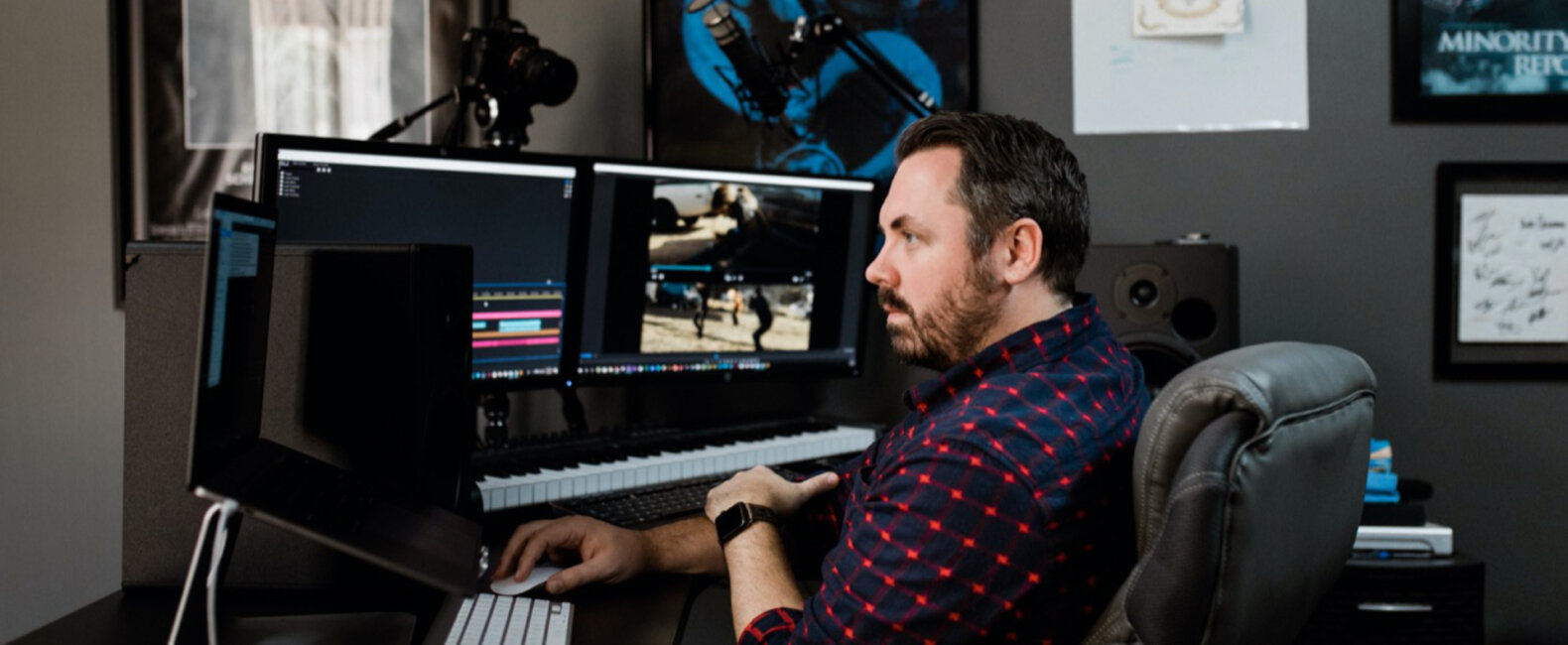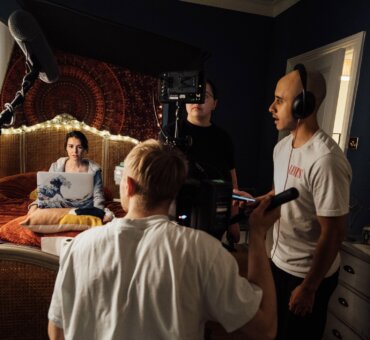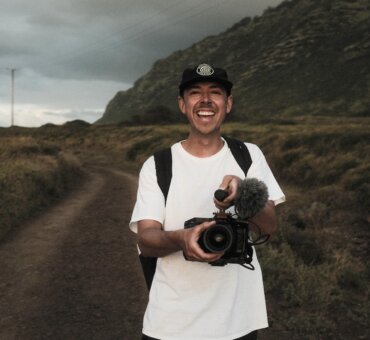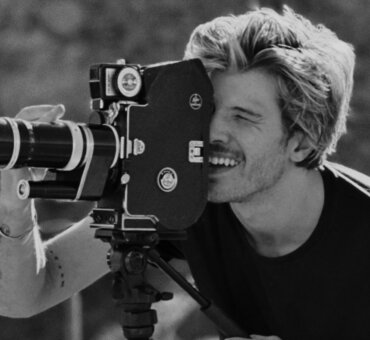It’d be nice if we all got a do-over. Just a one-time reset button to go back and start over. How would your career look if you knew then what you know now?
Unfortunately, you can’t go back. Sorry, aspiring time travelers.
What we can all do is use today as an opportunity to soak in every bit of information possible. Equip yourself with knowledge to make smarter moves now, so you don’t need to wish for a do-over. That’s why we sat down with one of YouTube’s most-seasoned creators—to hear what advice he’d give himself if he could go back to when he first began.
In Episode 5 of YouTube Masters, Ryan Connolly, Founder of Film Riot, shares what you should know before starting your YouTube channel. Read why Ryan believes creating content out of love for the craft, rather than views and money, is key in building your audience.
Here’s Ryan.
Welcome to this episode of YouTube Masters. My name’s Ryan Connolly, I have this show on YouTube called Film Riot that I’ve been doing since 2009, so my YouTube career has now lasted 11 years and is still going. A question that I get often is tips about starting a YouTube channel.
Right off the bat, I just want to say that if you came here trying to find some answers on how to get rich on YouTube, you came to the wrong place. That’s not what this is about. But what I did want to dive into are 8 tips that I wish I knew when I was first starting with YouTube. Let’s jump into it with tip #1.
Tip #1. Don’t Do It For Views Or Money
Now, of course, you can get a lot of views and you can make good money on YouTube, but that’s as likely as breaking into Hollywood. It’s possible, but there’s a greater percentage that it’s not going to succeed in that way than it does.
It’s really about doing it because you’re passionate about it. You’re getting something creative out of it, and that’s best for what you’re making—helps that cream rise to the top. Because if it’s something that you’re passionate about, people are far more likely to latch onto that.
Tip #2. Pick The Right Project For You
If you’re chasing something that somebody else is doing, you like what they’re doing and how they’re doing it and that’s why you want to do it, don’t do it. They’re already doing it and likely are doing it much better than you were going to because it’s organic to them and probably made popular because of them.
If it’s universally popular right now and you’re doing it because of that, don’t do it. There’s probably going to be several other people doing that same thing and again, you’re just chasing views.
If you’re doing it because it’s something that you’re incredibly passionate about, and whether other people are doing it or not, you feel you have a unique angle on it and can add your voice into the mix of this thing, then absolutely do it. Like I said in the first tip, if it’s something that you personally really care about, that’s the best way to get an audience to attach to you because they’re going to see that authentic passion in you and that is very relatable.
Tip #3. Find Your Structure
So at this point, you know what you want to make the thing about, but what is it? Is it a one-off? Is it a series? Is it an ongoing thing like Film Riot where you’re doing it weekly or maybe bi-weekly, but it continues for an indefinite amount of time?
You need to answer those questions. Figure out what this thing really is and then dial in the structure of what each episode will be. Say it’s a series. Find out what the structure of each of those are, which is finding out the voice of what this thing is so you can continually develop it in the direction you want it to go.
Not only that, but the first thing that you make also doesn’t have to be the first thing that you post. It probably shouldn’t be. Make some test episodes. Do a full episode as if you were going to post it, and then don’t. Show your friends, get feedback, refine from there, and keep going. Especially if you’re the host. It’s a really good idea to start hosting in front of the camera. Get comfortable with that, get feedback on what’s working and not working with you as a host so you can refine that as well.
Tip #4. Finding The Right Pacing
Finding the right pacing for your piece. That’s not saying that everything needs to be at a lightning-fast pace, it can be a slower pace if it’s right for the project. But oftentimes, even when it’s supposed to be a slower pace, it’s too slowly paced, feeling very sluggish and you’re going to lose your audience with that.
Pacing can also be about what you’re putting up front to hook your audience, making sure that they’re going to stay within the entire video. But oftentimes, I’ve noticed that the pacing is a bit slow, maybe because people are trying to chase that YouTube algorithm. Hit over 10 minutes because it’s more likely to be seen. But again, do you want to chase the YouTube algorithm, or do you want to make the best possible project you can?
Show it to your friends. Watch them watch it. It’s crazy how much difference a project will be when you’re watching it through the eyes of someone else. Do they start to drift away? Can you feel a lull in the piece once they’re watching it?
Find those trouble spots and tighten those up. But it’s also a good idea to just make it as fast as you possibly can. Trim more frames. Keep trimming until it feels too fast, and then add some air back in. After you’ve done that for a bit, you start dialing in and finding where the sweet spot is of pace for your project.
Tip #5. Finding The Right Music
Music is the sort of make-and-break thing for the tone of your piece, and the wrong music is going to shift the feel of your project in a direction that you didn’t intend. So, it’s really important to find the music that’s going to set the tone that you do intend for your project. Because the right music really can elevate a piece as a whole and bring life to it in really exciting ways.
A well-edited piece can feel like the pacing is off just because the wrong music was chosen, or because the same track was used for 10 straight minutes.
After a certain amount of time, your audience will become aware of a repetitive track and that’s all they’ll hear. But, it’s also helpful to switch up the music for tonal changes or shifts in the topic. It just makes the whole thing feel like it’s moving in a new direction and keeps the pace nice and fresh.
Hear some of Ryan’s favorite songs on Musicbed below.
Tip #6. Prepare For The Comments
We all know about the comment section, we all joke about the comment section, and thankfully — for the most part — comments are really good. You have positive comments and you have negative comments, but even the negative ones are often very helpful and they’re just critique or feedback and that’s great.
That’s not what I’m talking about. What I’m talking about are the hateful comments, and they are coming. Over the 11 years of our YouTube career, we’ve had some horrible comments thrown our way, including dismissive ones, which are some of the worst.
When they just dismiss your work as an artist putting this thing out — that’s tough to read. We’ve even had death threats. But you need to be able to ignore these things. You need to be able to let them roll right off your back. You have to build a thick skin. Otherwise, these things will get to you and they will stick with you, and you do not need this.
You need to realize that the people that are usually spreading those hateful comments are people that often have something going horrible in their own lives and they’re looking for a punching bag. They’re not this angry about your video on making coffee. They’re angry about something else entirely. So understand that, learn that, and completely ignore those types of comments.
Tip #7. Make Plans For Revenue
Like I said before, this is not a “Get Rich on YouTube” tutorial, but there are ways that you can make revenue if you are doing this for a long period. The first one is to invest in yourself. Invest time and energy into this thing. It might take a long time before it becomes financially viable for you in any real way.
Film Riot was about a year-and-a-half to two years before it was truly yielding any kind of money to where I could leave my full-time job and make this my main thing. And as far as views go, you really need to be in the hundreds of thousands to millions to really make a nice chunk of change as far as full-time money. But once you start getting a following, some consistent views, or right upfront, if your quality is high enough, you could go to companies that make sense for what you’re working with to see about doing some partnerships there.
Maybe build-in some ads within your thing that’s not just relying on views only. Finding those partnerships, those collaborators, those sponsors, could be a part of your project to sustain you as well.
And then, of course, there’s merchandise, but merchandise without an audience doesn’t work. That’s one where you do need to build up that audience first and then have merchandising coming in. But I think it’s really good to have a five-year plan of all those things right upfront if you are looking to do something that has longevity.
Tip #8. It’s Really F***ing Hard
It’s really f***ing hard — which is not a tip, at all. It’s just a statement, and it’s true. It’s a marathon, it is absolutely not a sprint. And at first, maybe it’s fun. You’re obsessed with this thing, and it’s exciting, it’s new, but if you’re doing something that’s weekly, even bi-weekly, or even monthly, and you have the rest of your life going on — especially if you have another job and you’re trying to get this going as I did in the beginning — it can be really difficult.
It sucks up your time in a way that you are not expecting if you’ve never done this before. And anybody out there who says that doing a YouTube show of some kind, something that is consistently going out to an audience to watch and critique and trying to make it the best you can over and over, and reinvent it over and over — if they say that it’s easy, they’re either lying or they have a massive team and they don’t have to do that much. It’s only one of the two.
These are 8 tips that I wish I knew going into it in the beginning. And I know these aren’t technical things, I know these aren’t things that are diving into gear or how to compress your video because I don’t think those are the most important things. I really don’t.
After 11 years, these are the things that I think are the most important to make the most quality thing you can, and have a chance at longevity. Making this a career that will sustain you. With all the technical stuff, you can find a thousand places online. There are a billion people that will talk about every single camera ever made by man across the history of time. You can find those. But these things I think are the foundation of making anything that’s going to be worth a damn on YouTube.
Now that you know what it takes to start a YouTube channel, check out our previous episode with Colin and Samir where they talk about The Biggest Mistake Filmmakers Make.




















































































